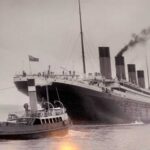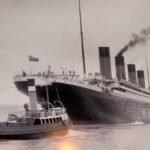Couple Are Stranded in Africa After Their Cruise Ship Left Without Them
The post Couple Are Stranded in Africa After Their Cruise Ship Left Without Them appeared first on Healthy Holistic Living.
In a distressing turn of events, a South Carolina couple found themselves stranded on an isolated island off the coast of Africa, sparking both concern and outrage. The incident unfolded when Jill and Jay Campbell, along with seven other passengers, were left behind by their cruise ship, the Norwegian Dawn.
This mishap occurred after a day of private touring on São Tomé and Principe, a small island renowned for its breathtaking landscapes and rich cultural heritage. What was supposed to be a leisurely stop on their grand cruise around the continent quickly turned into a nightmare, highlighting the unforeseen risks associated with sea voyages and the responsibilities of cruise lines towards their passengers.
This incident not only left the stranded passengers grappling with unexpected challenges but also sparked a broader conversation about the safety, communication, and support systems in place for travelers on such expeditions. As the story of the Campbells and their fellow passengers unfolds, it serves as a stark reminder of the unpredictability of travel and the critical importance of preparedness, empathy, and assistance from all parties involved in the tourism and hospitality industry.
The Unforeseen Ordeal: Stranded Far From Home
Jill and Jay Campbell embarked on a journey intended as an adventurous circumnavigation of the African continent aboard the Norwegian Dawn, starting from the vibrant shores of Cape Town, South Africa. However, they encountered a situation far from the picturesque voyage they had envisioned.
On a seemingly ordinary day, the couple, along with a small group of international tourists, decided to explore the lesser-known island of São Tomé and Principe, enticed by its promise of natural beauty and serenity. Little did they know, this detour would lead them into an unexpected crisis.
As the tour extended beyond its scheduled time, the group’s attempt to return to their floating hotel turned futile. Despite the tour operator’s efforts to inform the ship’s captain of their delayed return, the Norwegian Dawn made the controversial decision to depart without them.
Stranded on São Tomé
This left the Campbells and their companions stranded on São Tomé, an island where the beauty of nature starkly contrasted with their growing sense of abandonment. The implications of this decision by the cruise ship were profound, stranding not just any group of tourists, but a collective that included vulnerable individuals facing serious health and mobility challenges.
The group, comprising seven Americans and two Australians, found themselves in a precarious situation, encompassing individuals with special needs, including a paraplegic, a pregnant woman, and a person with a heart condition. The refusal of the ship to wait for them, despite being notified of their late return, has raised questions about the policies of cruise lines in handling such emergencies.
In the ensuing days, the stranded passengers tested their resolve and resources as they navigated the logistical and emotional turmoil of being left behind. With limited access to essentials and the looming uncertainty of their return, the group’s ordeal underscores the precariousness of travel in remote locations and the responsibility of cruise lines to ensure the safety and well-being of their passengers.
This incident not only highlights the need for better communication and contingency planning by travel operators but also the spirit of resilience and solidarity among travelers in the face of adversity.
Navigating Crisis Among Stranded Travelers
In the wake of their abandonment, the stranded group found themselves in a predicament that would require more than just patience to overcome. Among them were individuals who brought to light the diversity of human conditions that can often be overlooked in travel logistics.
An 80-year-old woman, having suffered a concussion with partial vision loss from a prior incident, epitomized the vulnerability within the group. Her situation became even more dire when it was revealed she had been left at a local hospital without any financial means or contact with her emergency support, a negligence that could have led to grave consequences if not for the intervention of fellow stranded passengers.
The compassion and leadership displayed by Jill Campbell during this crisis became a beacon of hope for the group. Her actions, alongside her husband Jay, in utilizing their available resources to provide for the basic needs of everyone, demonstrated an extraordinary level of empathy and resourcefulness.
Forging Community Amidst Crisis
By securing food, toiletries, and accommodation for the group, the Campbells not only addressed the immediate physical needs but also fostered a sense of community among the passengers. This collective spirit of endurance and mutual support was a testament to the human capacity to adapt and find strength in unity.
Moreover, the involvement of the U.S. Embassy in Angola in arranging travel to Gambia for the group underscored the crucial role that diplomatic entities play in assisting citizens stranded abroad. However, the uncertainty of rejoining their cruise without the explicit approval of Norwegian Cruise Line loomed large over their heads.
This scenario sheds light on the intricate dynamics between travelers, cruise companies, and governmental bodies in managing crises that arise in international waters or foreign lands. The Campbells’ ordeal and the collective effort to navigate the challenges presented by their stranding are powerful reminders of the resilience that emerges in the face of adversity and the profound impact of solidarity in overcoming daunting obstacles.
Navigating the Aftermath: A Call to Action
The ordeal that unfolded on the shores of São Tomé and Principe illuminates the stark realities and challenges faced when travel plans go awry, particularly under the auspices of large cruise lines. Norwegian Cruise Line’s stance, emphasizing the passengers’ failure to adhere to the designated ‘all aboard’ time, underscores a prevalent industry perspective that places the onus of punctuality squarely on the shoulders of its guests.
This policy, while understandable from an operational viewpoint, has ignited a debate on the necessity for cruise lines to exhibit greater flexibility and empathy in situations beyond the control of their passengers.
The incident not only spotlighted the logistical nightmares of being stranded in a foreign land but also the emotional and psychological toll such experiences exact on travelers. The collective endeavor by the Campbells and their stranded companions to secure essentials and navigate their unexpected predicament showcases a remarkable human resilience and the capacity for mutual aid in times of distress.
However, it also casts a spotlight on the critical need for travel operators to reassess and strengthen their emergency response strategies and customer support systems.
Improving Crisis Communication and Support in Cruise Travel
In the days following their unexpected stranding, the stranded passengers’ attempts to reach out to Norwegian Cruise Line for assistance and the reported lack of response further accentuate the gap in effective communication channels between travelers and cruise operators in crisis situations.
This gap not only exacerbates the challenges faced by stranded passengers but also raises questions about the adequacy of existing protocols to address such emergencies.
As the travel industry continues to navigate the complexities of global tourism and the unpredictable nature of travel, this incident serves as a poignant reminder of the need for comprehensive policies that prioritize passenger safety and well-being.
It underscores the need to establish robust support systems that can adapt to the nuances of unforeseen events and ensure that the spirit of adventure that draws people to cruise vacations does not succumb to the fear of neglect in times of need. The conversation sparked by the Campbells’ story is a vital step towards bridging the divide between operational efficiency and the ethical imperative to safeguard and support every passenger’s journey.
Empowering Travelers: Lessons and Strategies for Future Journeys
The story of Jill and Jay Campbell, alongside their fellow passengers stranded far from home, sheds light on the unpredictable nature of travel and the paramount importance of preparedness and awareness. This incident is not merely a recount of an unfortunate travel mishap but serves as a crucial learning opportunity for both travelers and the travel industry at large.
Research and planning: Before embarking on any journey, especially to remote or less familiar destinations, thorough research and planning are essential. Travelers should be aware of the logistical specifics, such as the timing of tours in relation to ship departures and local emergency contacts.
Understanding rights and responsibilities: Knowing one’s rights and responsibilities when traveling, especially on cruise ships or organized tours, is crucial. Familiarize yourself with the terms and conditions of your travel agreement, and understand the protocols for missed departures or emergencies.
Emergency contacts and resources: Always have a list of emergency contacts, including local embassies or consulates, and understand the process for seeking assistance in foreign countries.
Communication channels: Establishing clear and reliable communication channels with travel operators and fellow travelers can enhance safety and coordination.
Building a support network: Travelers should not underestimate the value of building connections with fellow travelers and local communities, which can be a source of assistance and guidance in times of need.
Advocacy for change: Travelers can share their experiences and insights through forums, social media, and consumer advocacy groups to promote better practices and preparedness strategies.
The narrative of the Campbells and their unforeseen adventure is a poignant reminder of the unpredictable elements of travel. It encourages a proactive stance towards travel planning, equipping oneself with the necessary knowledge and tools, and fostering a sense of community and advocacy.
Towards a Safer and More Compassionate Travel Future
The experiences of Jill and Jay Campbell, along with their fellow stranded passengers, illuminate significant lessons not only for travelers but also for the entities that operate within the tourism and hospitality industry.
This incident underscores the need for a paradigm shift towards creating a travel environment that is not only efficient but also resilient and responsive to the human elements of travel. As we look towards the future, the collective aim should be to foster an ecosystem where safety, empathy, and support are embedded into the very fabric of travel experiences.
Strengthening Industry Standards and Practices
The travel industry, including cruise lines, tour operators, and hospitality providers, must revisit and potentially revamp their policies and procedures to handle emergencies with utmost care and consideration for all passengers.
This entails not just adhering to existing safety regulations but also innovating in the realms of customer service, emergency response, and communication. The goal should be to create an infrastructure capable of supporting travelers in every conceivable situation, ensuring that no one remains vulnerable or unsupported.
Encouraging Responsible and Informed Travel
On the flip side, travelers have a role to play in fostering a safer travel environment. This involves being informed, prepared, and responsible. Understanding the nature of their journeys, the potential risks involved, and the best practices for mitigating these risks is crucial.
Travelers should also be proactive in communicating their needs and concerns with travel providers and seeking out resources that can aid in their travel decisions. Through a partnership between informed travelers and conscientious service providers, the travel industry can achieve a balance between adventure and safety.
Advocating for Compassion and Change
Ultimately, empathy and a commitment to continuous improvement must pave the path forward. Stories like that of the Campbells should serve not merely as cautionary tales but as catalysts for positive change within the travel industry.
By fostering dialogue, sharing experiences, and advocating for policies that prioritize the well-being of all travelers, we can envision a more inclusive and compassionate travel landscape. This includes recognizing the diversity of travelers’ needs and ensuring that the thrill of exploration is accessible to everyone, without compromising on safety or dignity.
As we reflect on the journey of the stranded passengers off the coast of Africa, let it serve as a reminder of the unpredictability of travel and the inherent human spirit of resilience and community. The future of travel should not involve fear and uncertainty but should ensure that every journey, no matter how far from home, receives support from a network of care, understanding, and preparedness. In striving for this future, we not only enhance the travel experience for all but also honor the lessons learned from those who have navigated the challenges of the unexpected.
The post Couple Are Stranded in Africa After Their Cruise Ship Left Without Them appeared first on Healthy Holistic Living.
Related posts:
 A Lot Of People Are Only Just Finding Out Where The Titanic Actually Sank
A Lot Of People Are Only Just Finding Out Where The Titanic Actually Sank
 Airline is offering an ‘all you can fly’ plane pass costing less than $650 for the year
Airline is offering an ‘all you can fly’ plane pass costing less than $650 for the year
 Honoring Titanic’s Legacy: Letting the Ship Rest in Peace
Honoring Titanic’s Legacy: Letting the Ship Rest in Peace
Powered by YARPP.







